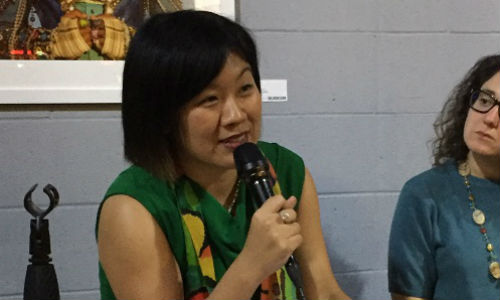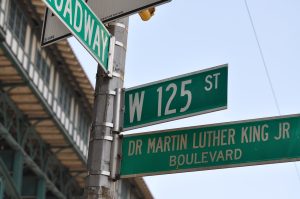I was recently tapped by the Democratic Women of Monterey County (DWMC) to join their panel of community journalists on “Reporting in the Age of Trump.” I swiftly accepted the invite, not because I particularly enjoy public speaking, but because I welcomed the chance to defend my profession. To connect with the community and readers and tell them why we exist.
Over wine and coffee, I mingled with members of the community, exchanged business cards, and mulled over the list of topics my fellow panelists and I would tackle—fake news, Trump’s impact on journalists, the role of social media, gender bias in journalism and what the public should expect from the press today. And my favorite question: Why is regional journalism important and why does the public need local news outlets? Community news, after all, is my forte.
I shouldn’t have been surprised the event was sold out. President Trump’s very public lashings at the mainstream media had thrust journalists in the spotlight.
Curiosity about what we do
The core of the lively panel discussion focused on the state of the local journalism industry, and why community news is critical to residents and, in a bigger context, civic engagement.
My fellow panelists—the editor of the alternative weekly paper Monterey County Weekly and the editor of the blog Monterey Bay Partisan—were asked everything from how readers can be savvier on sniffing out fake news, to how we curate what goes in the paper or website.
When we plunged into panel mode I had the chance to shed light on the challenges and opportunities reporters in local newsrooms face. I explained why I attend City Council meetings in person, why I choose to Tweet and Instagram some things and not others, and how to tackle a seven-month investigation into Prop 47 prison reform legislation in a two-person newsroom.
I talked about how technology allows journalists to work more efficiently and independently. Case in point: Google’s free tools such as maps and reverse image search, great for making graphics and fact-checking. Has anyone heard of FirstDraft?
I discovered that most folks don’t know what local reporters do, how news is produced, how the stories are curated and why some things end up published and others never see the light of day. And how would they? How often do journalists leave our own comfort zone, connect with the community and share what we do?
Do people still want the news?
Most readers see newspapers literally shrinking and are well-aware our paper has gone from publishing daily to three days a week. They still love the news. But dinner banter now includes “fake news” and Trump’s Twitter addiction. They tune into CNN or MSNBC and watch the White House briefings half shocked and half amused when reporters are chewed out by Trump or Press Secretary Sean Spicer.
So what better time to leverage this opportunity and be salespeople for our profession? Being a guest speaker, panelist or guest lecturer is an excellent opportunity to shamelessly sell our “products,” give our profession a plug and most importantly defend local news. The local news outlet is a critical part of civic engagement.
By the end of the evening an entourage of attendees thanked my fellow panelists and me for sharing.
“It really gave me insight into your profession. I actually didn’t know what journalists did every day,” one attendee said. One step forward.
Reporter’s Takeaway
Journalist as public speaker: Say yes to speaking engagements even if it is the local Rotary Club or Chamber of Commerce. At a time when people are increasingly skeptical of the media, it is important to dispel misconceptions about our profession.
Defend community journalism: The Washington press corps and major media outlets are getting a lashing from President Trump, but news-haters don’t differentiate between national and local press. If journalists didn’t cover local government, businesses or companies, where will fact-based information come from?
Create your own brand: Although hitting the public speaking circuit as a guest speaker isn’t the norm for reporters, it is a great way to publicize your paper and your brand. You are ultimately a salesperson for your organization, your profession and you.











